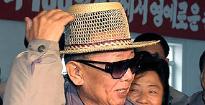Korean Nuke Program Outpaces Iran
 The New York Times reports:
The New York Times reports:
WASHINGTON — The Obama administration has concluded that North Korea’s new plant to enrich nuclear fuel uses technology that is “significantly more advanced” than what Iran has struggled over two decades to assemble, according to senior administration and intelligence officials.
In carefully worded public comments in recent days, senior American and South Korean officials have also argued that the new plant could not have been constructed so rapidly unless there was a sophisticated network of other, secret sites — and perhaps a fully operating uranium enrichment plant — elsewhere in the country.
These conclusions strongly suggest that North Korea has evaded layers of economic sanctions and efforts to intercept sea and air shipments, an effort begun in the Bush administration and accelerated after a United Nations Security Council resolution passed last year after the North’s second nuclear test. The intelligence estimates also greatly complicate the task for American diplomats — including a senior delegation of State Department and White House officials who left for China on Tuesday — who have been struggling for weeks to fashion a common plan with Asian allies and China to contain North Korea’s nuclear advances.
North Korea already has the fuel for 6 to 12 nuclear weapons and has conducted two nuclear tests, a capability it developed by harvesting plutonium from a nuclear reactor that was recently shuttered. While the North says the new uranium enrichment plant will produce fuel for reactors that could produce electricity for the impoverished country — the same argument Iran has made for its enrichment efforts — the North does not possess such reactors today. But if the plant is used to produce highly enriched uranium, it could give the country another pathway to increasing its nuclear arsenal.
Some American officials said they were most concerned that the real intent of showing off the new capability last month to a Stanford expert, Siegfried S. Hecker, a former director of Los Alamos National Laboratory, and two of his Stanford colleagues, was to advertise North Korea’s wares to other countries that might want to buy them. Dr. Hecker said he was “stunned” that North Korea had succeeded in building the plant so quickly.
Last Friday, Gary Samore, President Obama’s chief nuclear adviser, said for the first time that “the North Korean program appears to be much more advanced and efficient than the Iranian program, which is running into problems.” Reports from the International Atomic Energy Agency, the United Nations nuclear watchdog, indicate that the Iranians are experimenting with advanced centrifuges, but have not installed them on an industrial scale, despite years of efforts. Those efforts have been slowed by sabotage, according to widespread reports that Mr. Samore all but confirmed.
“The U.S. and its allies are doing everything we can to try to make sure that we complicate matters for them,” he said Friday.

